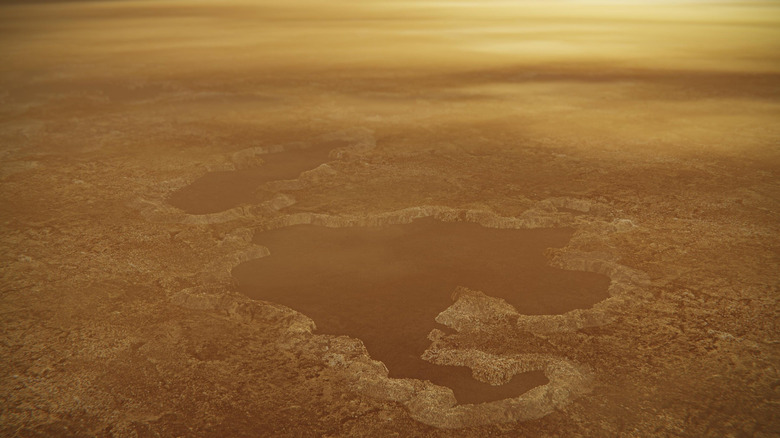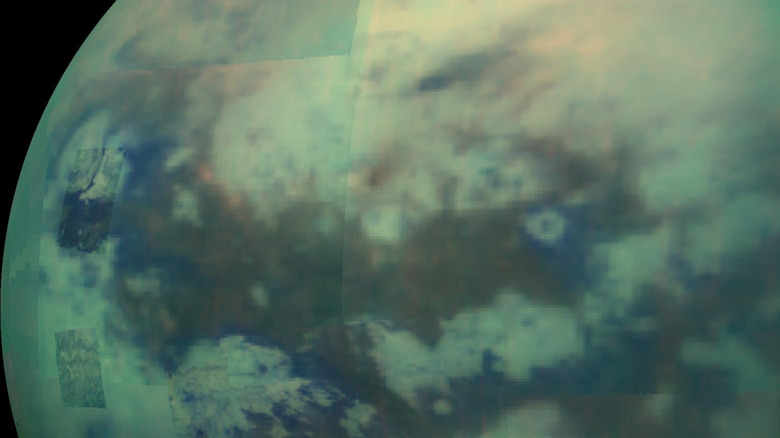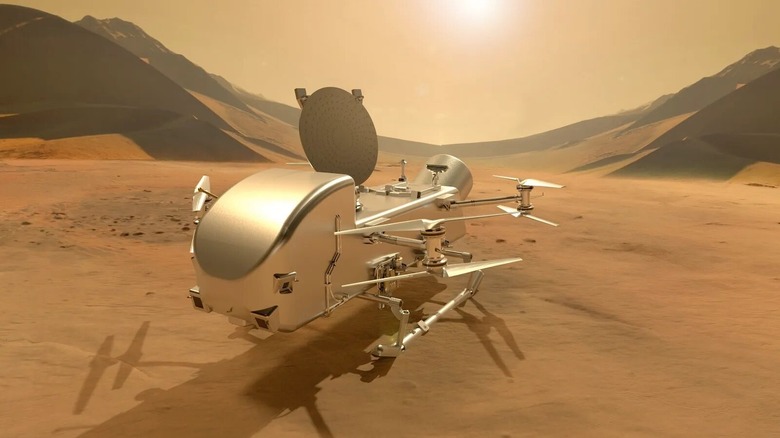Scientists Reveal Titan Might Support Life, Just Barely
When it comes to searching for places in our solar system beyond Earth that could be habitable, some of the most promising targets are moons. Scientists are hunting for life on Jupiter's moon Europa or in the deep ocean on Saturn's moon Enceladus; both moons have liquid-water oceans beneath thick, icy crusts. Saturn's larget moon, Titan, is of interest, too — enough that NASA plans to send its Dragonfly exploration mission to Titan in the next decade — and a new study finds that Titan might harbor life, but only a tiny amount.
Unlike other icy moons, Titan is covered in sandy material and has lakes of liquid methane on its surface, because it's so cold there. It has a thick atmosphere, with an ocean estimated to be 300 miles beneath its surface.
"In our study, we focus on what makes Titan unique when compared to other icy moons: its plentiful organic content," said Antonin Affholder of the University of Arizona, lead researcher for the paper published in The Planetary Science Journal.
The researchers used modeling to study how much life could be supported on the moon from its supply of organic molecules. These are molecules that form the building blocks of life, but aren't indications of life by themselves.
"There has been this sense that because Titan has such abundant organics, there is no shortage of food sources that could sustain life," Affholder said. "We point out that not all of these organic molecules may constitute food sources, the ocean is really big, and there's limited exchange between the ocean and the surface, where all those organics are, so we argue for a more nuanced approach."
The role of fermentation
You might think of fermentation as a technique for making pickles or beer, but it may also have played an important role in the history of life. Fermentation occurs as microorganisms break down organic molecules, without the need for oxygen, and Affholder says microorganisms like these could have been one of the earliest types of life on Earth.
"Fermentation probably evolved early in the history of Earth's life, and does not require us to open any door into unknown or speculative mechanisms that may or may not have happened on Titan," Affholder said.
The researchers wondered whether microbes like this could exist on Titan. And if they did, would there be enough material in the ocean deep beneath the surface for them to feed on, given that it is so far from most of the material in the atmosphere? When the researchers modeled Titan's environment, they found that even though the moon has plenty of organic material, only a small amount of this material would be suitable for these microbes to feed on.
"We conclude that Titan's uniquely rich organic inventory may not in fact be available to play the role in the moon's habitability to the extent one might intuitively think," Affholder said.
So is Titan lifeless?
This doesn't mean that Titan is necessarily a lifeless husk, but it does show that just because the ingredients for life are present in certain places on a world, it doesn't follow that the environment will necessarily be conducive to life developing.
The researchers have previously shown, in a paper in Advancing Earth and Space Sciences, that it isn't impossible for material to move from Titan's atmosphere down into its ocean. When a meteorite hits the surface, for example, it can impact hard enough to melt a section of the ice and create liquid water. This water can then sink down through the ice layers and carry material from the atmosphere into the ocean far below. The problem for those hoping to find life there is that this mechanism seems to enable only small amounts of material to be available in the ocean.
The researchers note that they are examining just one mechanism for one organic molecule, glycine, so there could be other ways for life to find food. However, they do show that a place with a good supply of organic molecules doesn't necessarily mean the conditions are good for life.
"Our new study shows that this supply may only be sufficient to sustain a very small population of microbes weighing a total of only a few kilograms at most — equivalent to the mass of a small dog," Affholder said. "Such a tiny biosphere would average less than one cell per liter of water over Titan's entire vast ocean."


